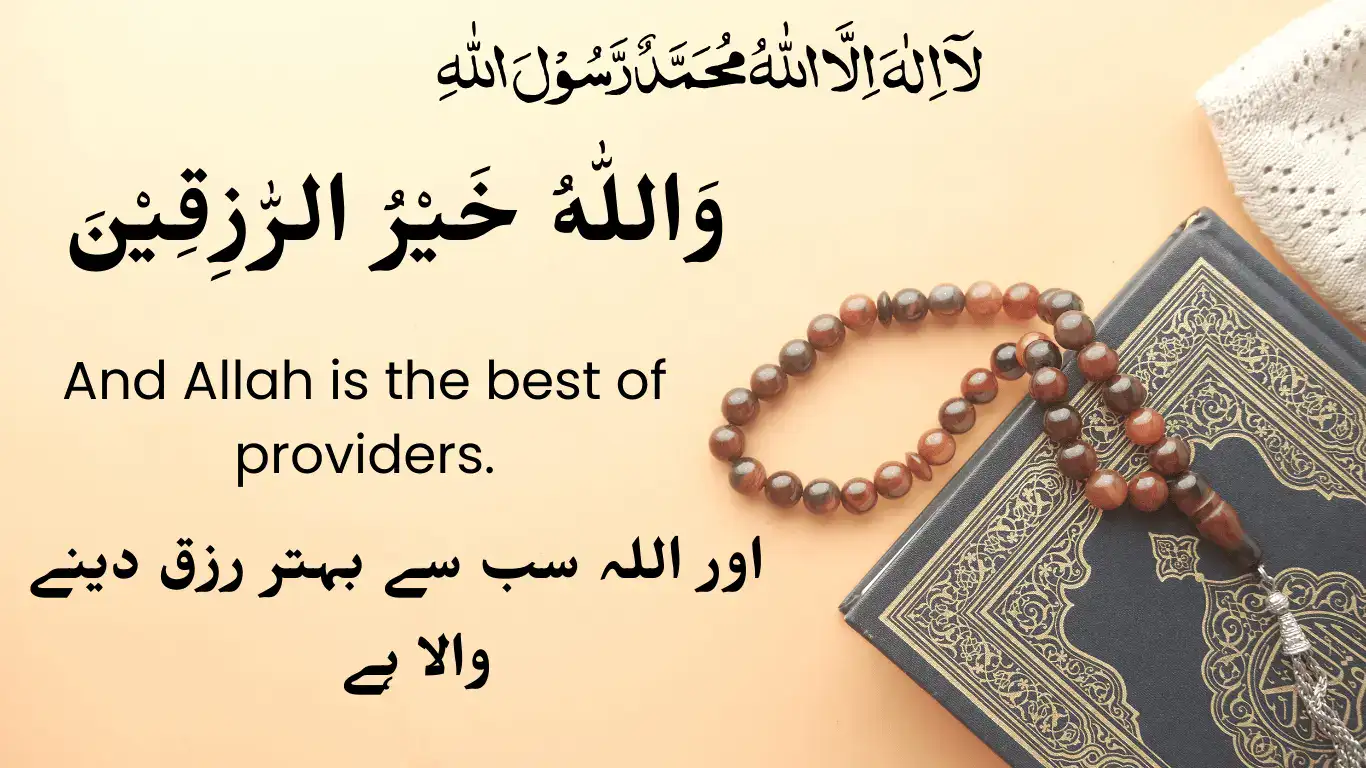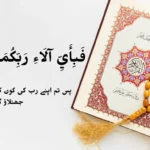In the Islamic faith, one of the beautiful attributes of Allah is Al-Razzaq, meaning the Provider. A phrase often referenced in the Quran and recited by Muslims worldwide is Wallahu Khairur Raziqin (وَاللّٰهُ خَيْرُ الرّٰزِقِيْنَ), which translates to And Allah is the best of providers. This phrase embodies a deep reminder that sustenance, in all its forms, comes from Allah alone. In this article, we will explore the significance of Wallahu Khairur Raziqin in Arabic, its meaning in Urdu and English, and how this concept is central to a believer’s faith and trust in Allah’s infinite provisions.
Arabic Verse and Translation
The phrase وَاللّٰهُ خَيْرُ الرّٰزِقِيْنَ is found in several places within the Quran. Let’s explore it further.
Arabic
وَاللّٰهُ خَيْرُ الرّٰزِقِيْنَ
English Translation
“And Allah is the best of providers.”
Urdu Translation
“اور اللہ سب سے بہتر رزق دینے والا ہے۔”
This powerful verse serves as a reminder of Allah’s role as the ultimate provider, reinforcing a sense of gratitude, trust, and reliance on Him alone.
| Dua e Qunoot witr |
| Wazu Ka Tarika: A Step-by-Step Guide |
| Namaz e Janaza: A Guide to Funeral Prayer |
| 15+ Alhamdulillah dp |
Understanding the Meaning of Wallahu Khairur Raziqin
The phrase “Wallahu Khairur Raziqin” is more than just words; it is a profound declaration of faith. It tells believers that their sustenance and provisions come only from Allah, who knows what is best for each individual. Here’s a deeper look at the elements of this phrase and what it signifies for Muslims.
1. “Wallahu” (And Allah):
The use of “Wallahu” places the emphasis on Allah, reminding us that He alone holds the power of provision. In Islam, Allah’s knowledge, wisdom, and ability to provide surpass human understanding.
2. “Khair” (Best):
“Khair” translates to “best” in English. When we say Allah is the “best” of providers, we acknowledge that His provision is without flaw, perfectly suited to each individual’s needs and situation.
3. “Ar-Raziqin” (Providers):
This term, derived from the name Ar-Razzaq, signifies Allah as the Provider. Unlike human providers who may face limitations, Allah’s resources are boundless. He gives without any measure and is the only source of sustenance.
The Concept of Rizq (Provision) in Islam
In Islam, rizq (رزق), or provision, encompasses everything Allah grants His servants, including wealth, health, relationships, and knowledge. Here’s how “Wallahu Khairur Raziqin” helps shape a Muslim’s view on provision:
- Reliance on Allah
This phrase teaches Muslims to rely solely on Allah for their needs. Believers understand that no matter the source of their income or support, it is ultimately Allah who is behind every blessing. - Contentment with What is Given
Recognizing Allah as the best provider encourages contentment. Muslims are reminded that whatever they have is precisely what Allah has chosen for them, fostering a sense of gratitude and peace. - Encouragement to Work Ethically
Knowing that Allah provides motivates Muslims to seek lawful (halal) means of earning. It also instills honesty in their dealings, as they trust that Allah will provide what is best. - Spiritual Provision
“Wallahu Khairur Raziqin” also applies to spiritual sustenance. Allah provides knowledge, guidance, and wisdom, all of which are essential provisions for the soul.
How Wallahu Khairur Raziqin Strengthens Faith
The phrase “Wallahu Khairur Raziqin” can be a source of comfort during times of hardship. When a believer is struggling, financially or otherwise, this verse reminds them to put their trust in Allah’s wisdom. It encourages patience and resilience, knowing that Allah’s provision is often beyond material wealth.
Moreover, it is a call to share what one has, as a way of showing gratitude for Allah’s blessings. When one recognizes that Allah is the ultimate provider, they are encouraged to help others, trusting that Allah will replenish what they give.
Reflecting on Wallahu Khairur Raziqin in Daily Life
- Gratitude for Blessings:
Regular recitation and reflection on this verse can foster gratitude in everyday life. It’s a reminder to thank Allah not only for wealth but for family, friends, health, and all forms of blessings. - Faith in Difficult Times:
When facing challenges, this verse is a reminder to hold firm. Believers are encouraged to remember that even difficulties come with Allah’s wisdom and are part of His divine plan. - Balancing Effort and Trust:
Islam teaches the importance of balancing effort with trust in Allah. While Muslims are encouraged to work hard, they are also reminded that the results are ultimately in Allah’s hands.
FAQs:
Wallahu Khairur Raziqin” translates to “And Allah is the best of providers.” It signifies that Allah alone is the ultimate source of all provisions and sustenance, reminding Muslims to place their trust in Him.
The phrase “Wallahu Khairur Raziqin” appears in multiple verses within the Quran, highlighting Allah’s role as the supreme provider. These verses serve as reminders of His boundless generosity and wisdom.
Reflecting on this phrase helps foster a sense of gratitude, contentment, and reliance on Allah. It reminds believers that all blessings come from Allah, encouraging ethical practices, patience, and generosity toward others.
Conclusion
The phrase “Wallahu Khairur Raziqin” is a powerful reminder of Allah’s infinite ability to provide. By internalizing its meaning, Muslims learn to rely on Allah wholeheartedly, understanding that He knows what is best for each person. This trust in Allah’s provision brings peace, gratitude, and humility into a believer’s life. Remembering that Allah is the best of providers allows individuals to navigate life’s ups and downs with a heart filled with faith and reliance on their Creator.




